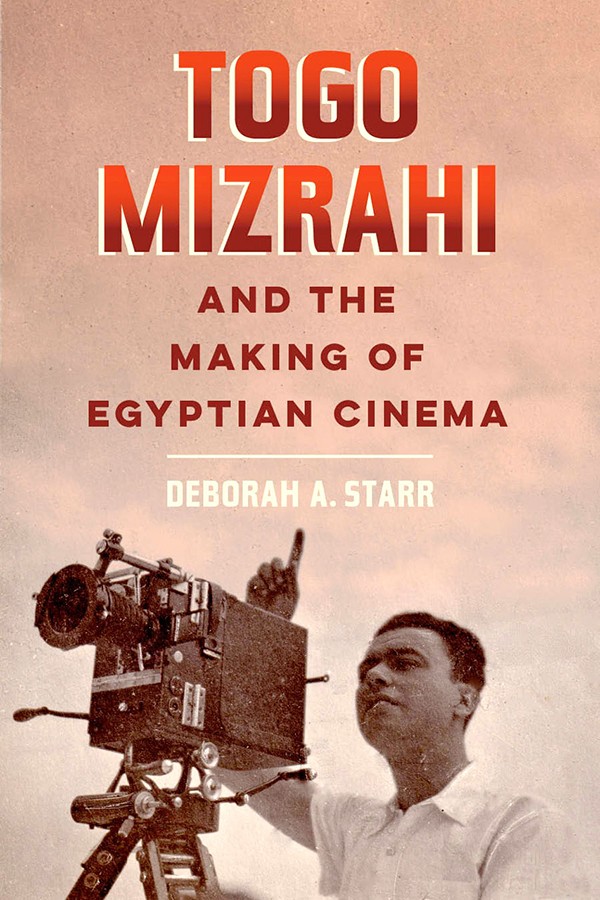Togo Mizrahi's 1937 film "Mistreated by Affluence" opens with a shot of Alexandria, Egypt. The camera pans to chickens feeding on a rooftop and then into a shabby one-room apartment, where two men - a Jew and a Muslim - wake up together in bed.
"An alarm goes off. They both hop up," said Deborah Starr, professor of modern Arabic and Hebrew literature and film in the College of Arts and Sciences. "It's a sign of their poverty. They share an extra room on the roof of a building."
The multi-cultural friendship between the Jewish character Chalom and the Muslim 'Abdu forms the comedic core of two of Mizrahi's films, according to Starr. The duo illustrates the director's vision of co-existence and belonging - for himself and for the nearly 80,000 Jews living in Egypt in the 1930s.
Mizrahi (1901-1986), a Jew born in Egypt with Italian citizenship, considered Egypt his home and helped start the country's film industry, Starr said. In her new book, "Togo Mizrahi and the Making of Egyptian Cinema," Starr reintroduces his films and career, arguing that Mizrahi and his work deserve a prominent place in Egyptian cinema history.
"Togo Mizrahi was one of the most prolific filmmakers of his day," she wrote. "Over the course of his productive sixteen-year career in the Egyptian film industry - from 1930 to 1946 - he directed and produced 30 Arabic-language feature films, most of which he also wrote."
Mizrahi's first objective was to entertain, Starr said, and he collaborated with some of Egypt's biggest stars. But his comedies and musicals also comment on his society, she added, promoting coexistence within an Egyptian society that was quite multi-cultural.
"Many scenes in Togo Mizrahi's 1930s comedies were shot on location in Alexandria's streets, cafes, beaches, parks - sites where people came in contact with one another," she writes. "In 'The Two Delegates,' Chalom and 'Abdu … stride out of a café together arm in arm."
The characters of Chalom (played by Leon Angel) and 'Abdu, (played by Abdu Muharram in "Mistreated by Affluence" and by Ahmad al-Haddad in "The Two Delegates") are prime examples of Mizrahi's vision, she said: "He takes the genre of farce and utilizes it for all its potential to critique social issues."
Starr pointed out that "Chalom" is pronounced like the Hebrew greeting "shalom" ["peace"], which is intentional.
"Like Charlie Chaplin's tramp, Chalom holds a mirror up to society," Starr writes. "Chalom, the 'ibn al-balad' ['salt of the earth' in Arabic] reflects Togo Mizrahi and Leon Angel's desire to articulate a particular vision of Jewish belonging within the Egyptian polity."
Mizrahi's Chalom films and others captured a golden moment of multi-cultural harmony in Egypt between WWI and WWII, Starr said, a time period that would be the setting of nostalgic literature starting in the last two decades of the 20th century.
Mizrahi wanted Egypt to be independent, and he wanted to be a part of it, Starr wrote. In 1936, when Egypt signed a treaty with Great Britain, he threw a party at his studio celebrating Egyptian independence.
He produced his last film in 1946. As the environment for Jews in Egypt deteriorated in the 1950s, he left Egypt and permanently settled in Italy. After he stopped making movies, nationalist critics marginalized Mizrahi and downplayed his contributions to the country's cinema, Starr wrote - a trend she wants to counteract with this book.
"I think it's an important part of this story, to recover that narrative," she said, adding that even if scholarship doesn't remember Mizrahi, fans of Egyptian cinema classics do.
Many of his films are available in Arabic on YouTube; a version of his film "Layla the Schoolgirl" with English subtitles is available in the Cornell Library collection.
Kate Blackwood is a writer for the College of Arts and Sciences.







